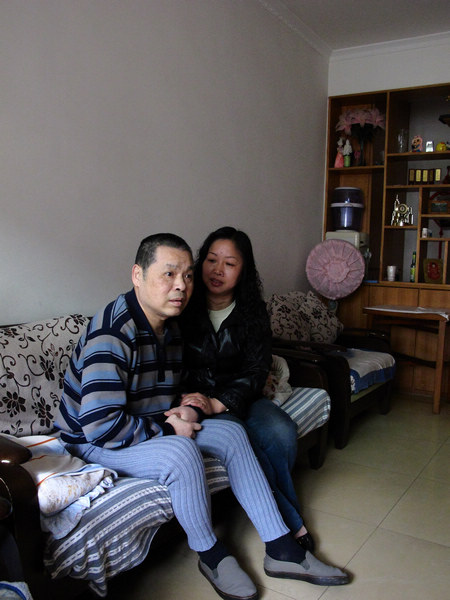Empty homes, broken families
Updated: 2012-04-24 07:53
By He Dan (China Daily)
|
||||||||
Parents who have lost their only child are increasingly worried about how they will cope when they grow old. Our reporter, He Dan, traveled to Wuhan and Nanchang to hear their stories.
Mei Yunqing, 52, lay quietly on a couch at his home in Wuhan, the capital of Hubei province, wearing a striped sweater that once belonged to his dead son.
"I asked him to wear it. I hope our son in heaven will bless his sick father," said Mei's wife, 49-year-old Zhang Taomei.
In 2007, their son, a 16-year-old high school basketball star, died from head injuries he suffered in a bad fall on the court. A year later, Mei suffered a stroke that left him blind and unable to walk. "My husband didn't like to speak about the pain (caused by the loss of their son). Instead, he turned to alcohol and that has ruined his health," said Zhang, who had recently undergone surgery to treat thyroid cancer. She also suffers from acute insomnia, which she believes is the result of overwhelming grief and depression caused by her son's death.
Their monthly income of 1,900 yuan ($300) barely covers medical bills and living expenses. "I dare not think about our old age," admitted Zhang. "We have no savings, so we can't afford to hire a maid or live in a nursing home."
Many aging couples in China face this problem. Traditionally, children become the main providers for their elderly parents. However, if the only child predeceases the parents, they are often left in financial and social limbo. A population and family planning law enacted in 2001 said that local governments should provide "necessary help" to couples who have lost their only child, but are incapable of conceiving again or adopting a child.
In 2007, the National Population and Family Planning Commission started a project to provide help for such couples and urged the provision of a monthly subsidy of not less than 100 yuan to each parent. In Shanghai, the sum has been raised to 150 yuan, but it's still a drop in the ocean. "It's better than no subsidy at all, but it isn't enough to improve our quality of life," said Zheng Puli, a 61-year-old Shanghai resident, whose daughter died in 2007.
China launched its family planning policy in the late 1970s. It's estimated that there are 120 million households with one child on the mainland, accounting for about 30 percent of the national total, according to Zhai Zhenwu, a leading demographer from the School of Sociology and Population Studies at Beijing's Renmin University. He predicted that by 2020, at least 1 million couples who have complied with the policy will end up childless, because some of those children will inevitably die as a result of illness, traffic accidents or other factors.

 Relief reaches isolated village
Relief reaches isolated village
 Rainfall poses new threats to quake-hit region
Rainfall poses new threats to quake-hit region
 Funerals begin for Boston bombing victims
Funerals begin for Boston bombing victims
 Quake takeaway from China's Air Force
Quake takeaway from China's Air Force
 Obama celebrates young inventors at science fair
Obama celebrates young inventors at science fair
 Earth Day marked around the world
Earth Day marked around the world
 Volunteer team helping students find sense of normalcy
Volunteer team helping students find sense of normalcy
 Ethnic groups quick to join rescue efforts
Ethnic groups quick to join rescue efforts
Most Viewed
Editor's Picks

|

|

|

|

|

|
Today's Top News
Health new priority for quake zone
Xi meets US top military officer
Japan's boats driven out of Diaoyu
China mulls online shopping legislation
Bird flu death toll rises to 22
Putin appoints new ambassador to China
Japanese ships blocked from Diaoyu Islands
Inspired by Guan, more Chinese pick up golf
US Weekly

|

|







